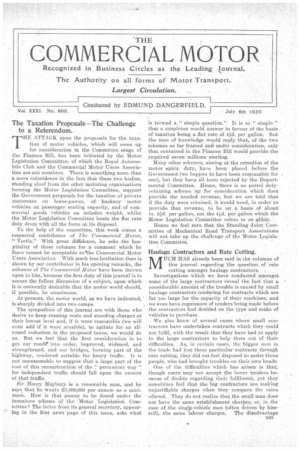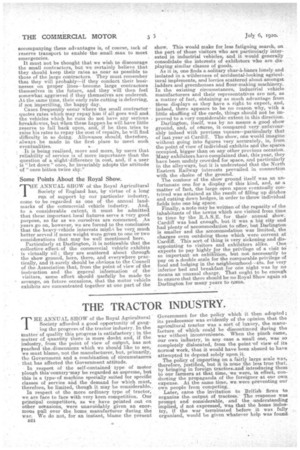The Taxation Proposals—The Challenge to a Referendum. _ T HE ATTACK upon the
Page 1

Page 2

If you've noticed an error in this article please click here to report it so we can fix it.
proposals for the taxation of motor vehicles, Which will come -up for consideration in the Committee stage of the Finance Bill, has been initiated by the Motor Legislation Committee, of which the Royal Automobile Club and the. Commercial Motor Users Association are not members.. There is something more than a mere coincidence in the fact that these two bodies, standing aloof from the other motoring organizations forming the Motor Legislation Committee, support the Government proposals for the taxation of private. motorcars on horse-power, of hackney motor vehicles on passenger seating capacity, and of commercial goods vehicles on unladen weight, whilst the gothr Legislation Committee beats the flat rate duty drum with all the force at its disposal. To the help of the committee, this week comes a respected contributor of The Commercial Motor, " Yectis." With great diffidence, he asks the hospitality of these columns for a comment which he fears cannot be acceptable tothe Commercial Motor Users Association. With much less hesitation than is shown by our contributor in his opening remarks, the columns of The Commeraal Motor have been thrown open to hint, because the first duty of this journal is to secure the fullest discussion of A subject, upon which. itis eminently desirable that the motor world should, if possible!, be unanimous.
At present, the motor world, as we have indicated,' is sharply divided into two camps. ,. The sympathies of this journal are with those who desire to keep riuming costs and standing charges at their lowest level and, if it were reasonable (we: will even add if it were sensible), to agitate for an allround reduction in the proposed taxes, we would do so. But we feel that the first consideration is to get our roadl into order, improved, widened, and strengthened, and our bridges, forming part -of the highway, rendered suitable for heavy traffic. It is not unreasonable to suggestthat a large part of the coat of this reconstruction Of the "permanent. way " for independent traffic should fall upon the owners of that traffic.
Sir Henry Mayb:ury is a reasonable man, and he says. that he iwants £7,000,000 per annum as a minimum. How is that nioney to be found under the immature scheme of the Motor ' Legislation Committee '1 The. letter from. its general secretary, appeasing in the first news page of this issue, asks what is termed a " simple questien." It is so " simple " that a simpleton would answer in favour of the basis of taxation being a flat rate! of 4id. per gallon, But the man of knowledge would reply that, of the two schemes so far framed and under consideration, only that contained in the Finance Bill would provide, the required seven millions sterling. Many other schemes, aiming at the retention of the motor spirit duty, have been placed before the Government (we happen to have been responsible for . one), but they have all been rejected by the Departmental Committee. Hence, there is no petrol dutyretaining scheme up for consideration which does provide the needed revenue, but we are told that if the duty were retained, it would need, in order to provide that revenue, to be on a basis of about qd. per gallon, not the 41d. per gallon which the Motor Legislation Committee refers to so glibly. Hence we feel sure that the Standing Joint Committee of Mechanical Road Transport Associations will not take up the Challenge of the Motor Legislation Committee.
MHaulage Contractors and Rate Cutting. UCH HAS already been said in the columns of this journal regarding the question. of rate cutting amongst haulage contractors. . Investigations which we have conducted amongst .. some of the large contractors reveal the fact that a considerable amount of the trouble is caused by small haulage contractors tendering for contracts which are far too large for the capacity of their machines, and we even have cognizance of tenders being made before the contractors had decided on the type and make of vehicles to purchase. . We also know of seVeral -cases where small contractors have undertaken. contracts which they could not fulfil, with the result that they have had to apply to the large contractors to help them out of their .difficulties. As, in certain cases, the bigger men in the trade had lost these particular contracts through rate cutting, they did not feel disposed to assist these people, who.had brought troubles On their own heads.
One of the difficulties which has arisen is that, .though users may not accept the lower tenders because of doubts regarding their fulfilment, yet they sometimes feel that the big contractors are making unjustifiable charges when they compare the rates offered. They do not realize that the small man does not have the same establishment ciharges, or, in thc ca-se of the sing1A-vehicle man (often driven by himself), the same labour charges. The disadvantage
accompanying these advantages is, of course, lack of reserve tranaport to enable the small man to meet emergencies. • It must not be thought that we wish to discourage the small contractors, but we certainly believe that they should keep their rates as near as possible to those of the large contractors. They must remember that they will probably—if they conduct their businesses on proper lines—become large contractors themselves in the future, and they will then feel somewhat aggrieved if they themselves are undercut. At the same time, their early rate cutting is deferring, if not imperilling, the happy day. Cases frequently occur where the small contractor quotes rates which may repay him if all goes well andthe vehicles which he runs do not have any serious breakdowns, but When these happen he will have little reserve to fall back upon, and, if he then .tries to raise his rates to repay the cost of repairs, he will find difficulty in so doing. Allowance should, thetefore, always. be made in the first place to meet such eventualities.
It is being realized, more and more, by users that reliability of service 18 of more importance thaft the question of a slight difference in cost, and, if a user 13 "let down" once, he invariably adopts the attitude of " once bitten twice shy."
Some Points About the Royal Show.
E ANNUAL SHOW of the Royal Agricultural • Society of England has, by virtue of a long run of support by our particular industry, come to be regarded as one of the annual landmarks of the commercial vehicle industry. And, to a considerable extent, it must be admitted that these important local fixtures serve a very good purpose, se far as we ourselves are concerned. As years go on, however, we are forced to the conclusion that the heavy-vehicle interests mifthe be very. much better served if more weight were given to one or two considerations that may be well mentioned here. Particularly at Darlington, it is noticeable that the collective effect of the commercial vehicle exhibits is virtually nil • they are scattered about through the show ground, here, there and everywhere practically, and it surely should be! obvious to the Council of the Association that, from the point of view of the instruction and the general information of the visitors, some effort should usefully be mad,e arrange, on future occasions, that the motor vehicle exhibits are concentrated together at one. part of the show. This would make for less fatiguing search, on the part of those visitors who are particularly interested in industrial vehicles and it would generally consolidate the interests of exhibitors who are displaying similar classes of goods.
As it is, one finds a solitary char4-bancs lonely and isolated in a wilderness of accidental-looking agricultural implements, and lorries scattered about amongst ladders and greenhouses and flour-making machinery. In the existing circumstances, industrial vehicle manufacturers and their representatives are not, as a matter of fact, obtaining as much advantage from these displays as they have a right to expect., and, indeed, them appears to be no reason why, with a little shuffling of the cards, things should not be. improved -to a very considerable extent in this direetion.
Darlington, itself, was by no means a good show ground, and, of course, it compared very unfavourably indeed with previous venues—particidarly that of last year at Cardiff. The show, one would imagine without going into figures very accurately, is, from the point of view of individual exhibits and the spaces occupied, bigger than on any other previous occasion. Many exhibitors have complained that, this year, they have been unduly croWded for space, and particularly in the alleyways, but it is understood that the North Eastern Railway interests prevailed, in connection with the choice of the ground. The contour of the show ground itself was an unfortunate one for a display of this kind, and, as\ a matter of fact, the large open space eventually contrived was attained as the result of filling up ditches and cutting down hedges, in order to throw individual fields into one big space.
Finally, a note may be written of the rapacity of the inhabitants of the towns which are visited from time to time by the R.A.S.E. for their annual show. Cardiff was bad enough, but it was a big city and had plenty of accommodation to offer, but Darlington is smaller and the accommodation was limited, the charges even outdoing those which were current at Cardiff. This sort of thing is very sickening and disappointing to visitors and exhibitors alike. One expects to pay highly or the privilege of a visit to so importantan exhibition, but not necessarily to pay on a double scale for the comparable privilege of food and lodging in the neighbourhood-48s. for very inferior bed and breakfast for one night was by no means an unusual charge. That ought to be enough to ensure that there should be no Royal Show again at
Darlington for many years to aonie. . .




























